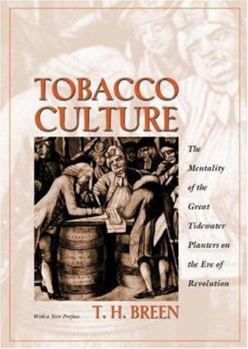Tobacco Culture: The Mentality of the Great Tidewater Planters on the Eve of Revolution
Select Format
Select Condition 
Book Overview
The great Tidewater planters of mid-eighteenth-century Virginia were fathers of the American Revolution. Perhaps first and foremost, they were also anxious tobacco farmers, harried by a demanding planting cycle, trans-Atlantic shipping risks, and their uneasy relations with English agents. George Washington, Thomas Jefferson, and their contemporaries lived in a world that was dominated by questions of debt from across an ocean but also one that...
Format:Paperback
Language:English
ISBN:0691089140
ISBN13:9780691089140
Release Date:September 2001
Publisher:Princeton University Press
Length:256 Pages
Weight:0.79 lbs.
Dimensions:0.7" x 5.6" x 8.5"
Customer Reviews
2 ratings
Revolutionary capitalists
Published by Thriftbooks.com User , 18 years ago
The agricultural origins of Americans' habits of revolution, even their habits of being distinguishable as Americans are too little emphasized, but T.H. Breen's "Tobacco Culture" goes a long way to rectifying that. The situation in the mid-18th century was not the first instance of unrest on the land, only the most consequential; it was followed by similar -- but different -- upheavals that led to civil war, to Roosevelt democracy and, the revolutionary spirit atrophying as the overall wealth and stability of America grew, to the disgruntlement of the Midwestern corn/hog/cattle farmers in the 1970s. A theoretical superstructure to bring all these into a general view would be welcome, if justified, but perhaps the rebelliousness of the farmers is not as coherent a concept as I think it is. American farmer unrest is different in kind from the jacqueries and rural incendiarism in other times and places, because the American farmer was, usually, a capitalist. Never more so than in mid-century Virginia and Maryland. Indebted capitalists, but capitalists all the same. And men with social status and political power -- not the source of radical revolution in most times and places. Breen's little book emphasizes the debts, the risks, the resentments as Scottish factors gradually gained (as it seemed to the farmers) a stranglehold on the independence of the rural plutocracy. The factors, in their own minds, were rather in the position of a fashionable West End tailor whose lordly customers are so far in arrears that he dare not keep cutting coats for them. It was a complicated situation, and it is a question how well the players truly understood where they stood in it, for all their education and sophistication, Perhaps Breen understands them better than they understood themselves. He warns against looking for monocausal explanations of world-shaking changes and explicitly denies that planter debt can explain American revolutionary changes. Of course. There were patriots in the Middle Colonies and in New England who were not affected by the long decline in tobacco as a commodity. Nevertheless, "Tobacco Culture" goes on the shelf with other key volumes that help us understand the greatest political event in human history: the American Revolution.
A scholarly look at the American Revolution
Published by Thriftbooks.com User , 24 years ago
I'm glad to see this was reprinted, as I found it to be a quite interesting look at reasons why American elites supported a war that most likely would have cost them everything they owned. The answer: they didn't own anything by the end of the 18th century. The reason why is that they had bought everything on credit against their tobacco crop. When the economy nosedived, the British merchants who held the debts wanted their due. The ensuing resentment by the planters led to support for the American revolutionary movement.Breen used exhaustive research in putting this book together, and even threw in some neat information on the Founding Fathers. Did you know Washington failed as a tobacco farmer? That he continually loaned money to a deadbeat that never repaid him? It's in this book.Another aspect of this book I found interesting was the step by step process of growing tobacco in the 18th century. It's hard to believe that anyone made a successful go of it. A neat book with a neat argument.






